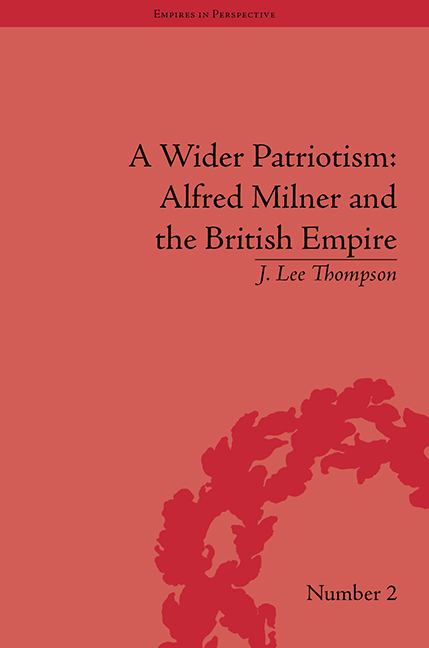Book contents
- Frontmatter
- CONTENTS
- Preface
- Acknowledgments
- Part I A Question about Which I Have Never Been Able to See the Other Side
- 1 Introduction
- 2 Imperial Propagandist: The Press, Politics and Public Opinion
- 3 Cromer and Egypt
- Part II Civilian Soldier of the Empire: South Africa
- Part III Constructive Imperialism
- Part IV Imperialism on the Anvil
- Notes
- Works Cited
- Index
2 - Imperial Propagandist: The Press, Politics and Public Opinion
from Part I - A Question about Which I Have Never Been Able to See the Other Side
- Frontmatter
- CONTENTS
- Preface
- Acknowledgments
- Part I A Question about Which I Have Never Been Able to See the Other Side
- 1 Introduction
- 2 Imperial Propagandist: The Press, Politics and Public Opinion
- 3 Cromer and Egypt
- Part II Civilian Soldier of the Empire: South Africa
- Part III Constructive Imperialism
- Part IV Imperialism on the Anvil
- Notes
- Works Cited
- Index
Summary
One key foundation stone of Milner's future success in the imperial sphere was laid in the early 1880s in his five-year career as a journalist. The anti-imperialist gadfly Wilfrid Scawen Blunt later noted that Milner's experience in Fleet Street gave ‘him the length of John Bull's foot very accurately, so that he is invaluable to the Empire builders’. Not only did Milner gain an insight into public opinion and newspaper methods, he also fashioned a network of contacts and supporters who would be invaluable to his South African and later policies. In 1880, only a year after leaving Oxford, Milner began submitting articles to the London press. The first pieces, mainly on German topics, were published in two Liberal journals, the Fortnightly Review and the penny evening Pall Mall Gazette, both edited by John Morley, the future Viscount Morley of Blackburn. Described as an agnostic Radical of Whiggish temperament, Morley was also an anti-imperialist who the previous year had dubbed Sir Bartle Frere a ‘Prancing Proconsul’ for his federationist policy in South Africa. W. T. Stead, who joined the paper in 1880 as Morley's second-in command, describes him as a cautious man with strong conservative instincts who does ‘not like new-fangled notions’ and ‘shrinks from leaps in the dark and venturesome experiments’. The Pall Mall Gazette reflected his serious and sober tenor.
When Morley was absent from the Northumberland Street offices, Stead was left in charge, but confined by Morley's injunctions against ‘purple patches’ in the leaders. A self-styled ‘barbarian of the North’, Stead had made a national reputation for himself at the Darlington Northern Echo. The assistant editor had great ambitions for the Pall Mall Gazette. He wanted the paper to ‘lead the leaders of public opinion’ and ‘combine the function of Hebrew prophet and Roman tribune with Greek teacher’, while at the same time being ‘lively, amusing and newsy’. Further, Stead hoped to foster greater unity among English speaking nations, improve and reform British imperial policy, and crusade for education, land and other reforms.
- Type
- Chapter
- Information
- A Wider PatriotismAlfred Milner and the British Empire, pp. 11 - 23Publisher: Pickering & ChattoFirst published in: 2014

